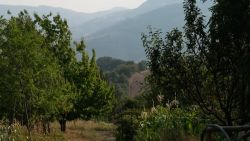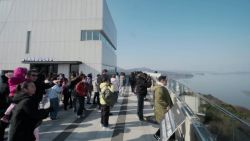Editor’s Note: CNN Travel’s series often carry sponsorship originating from the countries and regions we profile. However, CNN retains full editorial control over all of its reports. Read the policy.
Egypt is most known for its Great Pyramid of Giza or for luxury resorts on both the Mediterranean and the Red Sea.
Often overlooked is one of the country’s most spectacular landscapes, White Desert National Park.
The sprawling protectorate in the Farafra depression in western Egypt is a treasure trove of wonderment.
People touring these strange lands have often felt like they’re visiting another planet, despite only being a five-hour drive from Cairo.
Trips to Egypt’s Western Desert have been rising in popularity among locals and tourists alike.
Activities range from dune bashing and sandboarding to mountain biking and kayaking in the nearby Bahariya Oasis.
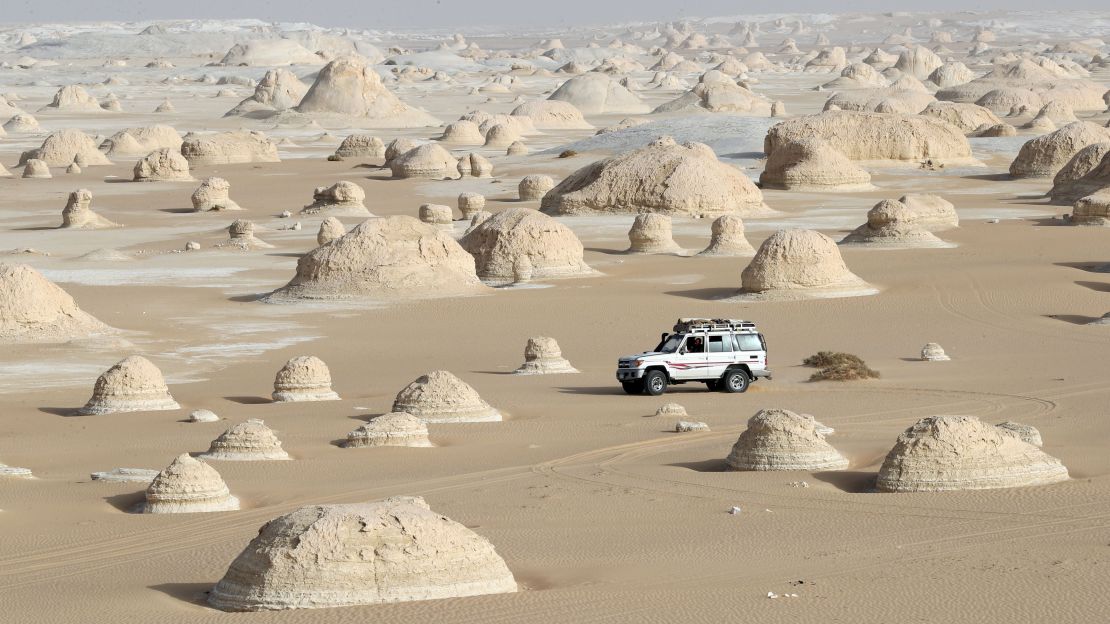
“The White Desert is so different from any place on the planet,” Ziad Omran, co-founder of the adventure travel company Destination 31, told CNN Travel earlier this year.
“Once they experience adventure travel there, they end up coming back again with their friends. So, they can experience it for themselves.”
Black Desert
A tour of Egypt's White Desert
The journey to the White Desert usually starts with a stop at an utterly contrasting landscape – the Black Desert.
This desert features a myriad of unique mountain ranges. Each one carries a coat of black stones thrown out of volcanoes millions of years ago, giving the sandy landscape its colored name.
After hiking up one of the peaks, it becomes clear that this area is devoid of any sign of life apart from a single road that stretches into the distance.
However, that isn’t the road that leads to the White Desert.
Reaching the national park requires deflating the tires of a 4x4 Land Cruiser and dune bashing across the desert at dizzying angles.
Zigzagging and racing down rolling dunes is a heart-pounding experience that eventually gives way to the instantly breathtaking view of the White Desert.
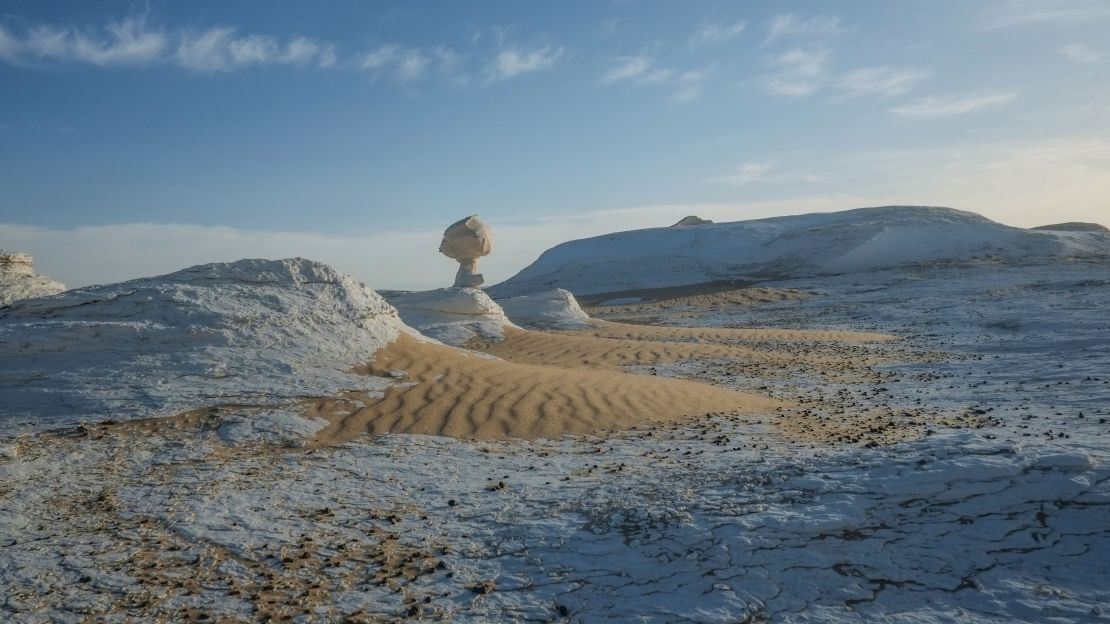
Within seconds of arriving, questions surrounding its mysterious origins arise as its eerie beauty provides a staunch reminder that our planet is subject to powerful climate changes.
It’s completely mind-blowing to believe that this was once a sea or an ocean and that the only evidence remaining is a collection of calcified limestone rocks sculpted over time by sand and wind.
These chalky abstract shapes seemingly change their color depending on the time of day, shifting from brilliant white to creamy, then reaching a golden brown.
When darkness falls
Nestled between the massive rock formations in the Valley of Agabat is a soft sandy hill that’s perfect for sand boarding.
Harder to carve and slower than riding down a snowy mountain, sand boarding still delivers a thrill, but there are no ski lifts in the desert and climbing up a steep sandy hill is exhausting.
As the sun sets, the desert reminds everyone that this is a land of extremes and every hour since the sun’s departure requires putting on a few additional layers of warmth.
After setting up camp, the local Bedouins prepare for visitors an authentic traditional dinner over an open fire.
The exotic aroma of the feast often draws attention from one of the rare residents of the White Desert – the fennec fox, also known as the sand fox.
These adorably harmless animals are hard to spot, appearing as shadowy silhouettes in the distance. They often approach campsites as they’re accustomed to counting on visitors’ leftovers as part of their diet.
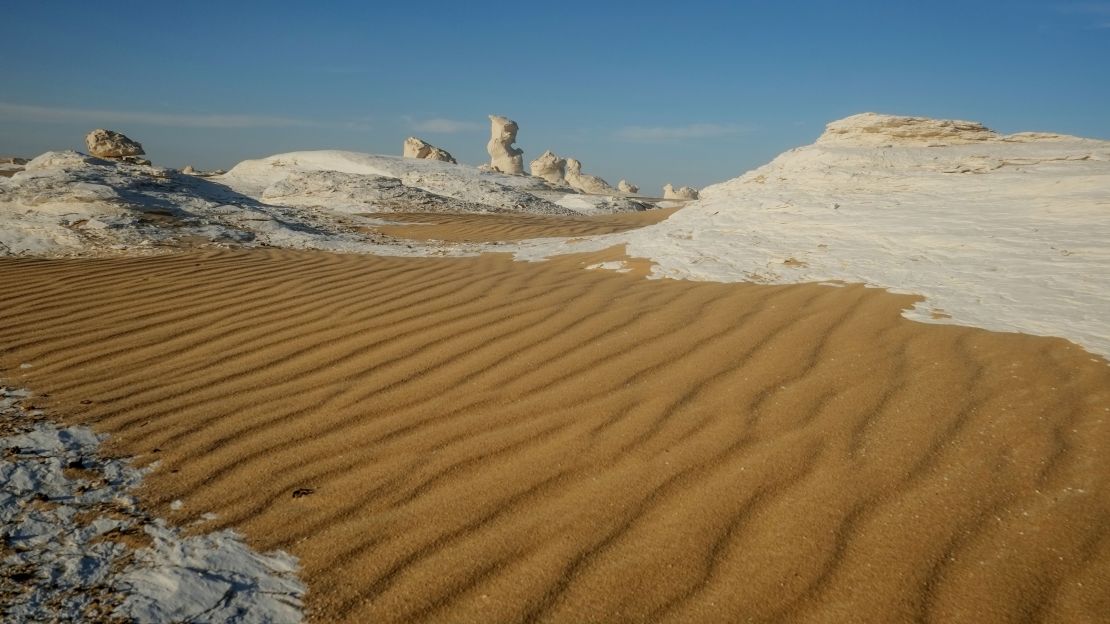
Because of the depth of the landscape and zero light pollution in any direction, the stars shine and streak across the sky at night. This marvelous scene is arguably one of the best environments on the planet to observe the Milky Way in all its splendor.
When the moon emerges, its brilliant light reflects off the rocky surfaces giving a blueish glow that illuminates the national park and invites nocturnal wandering across its otherworldly terrain.
Nighttime explorers need to be wary and bring a flashlight as it’s easy to get lost or trip up on the bumpy alien topography.
Exhilarating trail
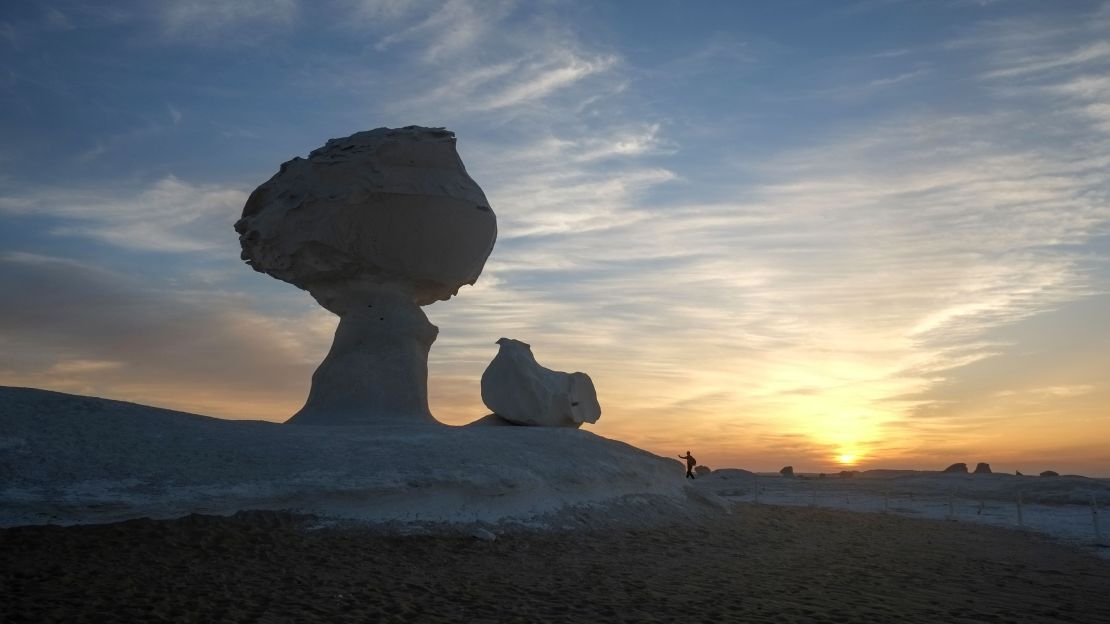
In the morning, the rising sun wakes up even the heaviest sleeper. Before packing up camp, it’s worth taking a hike to one of the park’s treasured sculptures aptly known, because of its shape, as the Chicken and Mushroom.
After leaving the park, most adventurers travel just over an hour away to the Bahariya Oasis.
A popular attraction in the area is to climb atop the English mountain, so named because of the ruins of a British World War I outpost that crowns its highest peak.
Reaching the top provides a spectacular 360-degree view overlooking the entire oasis, including the lush forests of delicious dates and olive trees. It also presents a challenging ride for mountain biking enthusiasts.
Cycling down its winding paths littered with loose jagged rocks and sandy patches is not for the faint-hearted but provides those with experience an exhilarating trail.
The bottom of the mountain leads into the pristine and untouched Bahariya Salt Lake. Incredibly, there’s no development around its shores, making the calm, therapeutic lake an excellent place for kayakers to catch a majestic sunset.
“My favorite part of the trip was kayaking with the golden rays bouncing off the water. It was a moment of pure wonder,” Noreen Fadel, one of the adventurers on a recent Destination 31 trip, shared with CNN Travel.
All these sights and activities can fit into a two or three-day trip. The longer the stay, the more time to explore the surrounding area as there are numerous attractions in the region that deserve attention.
It may be years or decades from now before traveling to the surface of the moon is possible. Still, for those who can’t wait till then, the White Desert National Park might the next best bet for lunar camping fantasies.


